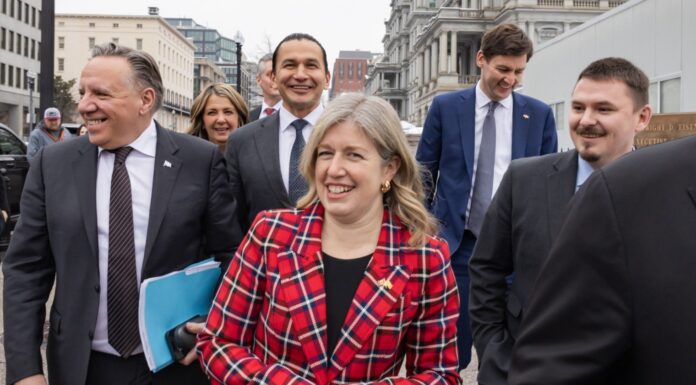
Following a 30-day extension from United States President Donald Trump, the threatened tariffs on Canadian goods crossing the American border are currently set to be instated on March 4.
New Brunswick Premier Susan Holt said that estimates show that “4,000 to 6,000” jobs could be lost if the tariffs are implemented.
“We’ve been building out and fine-tuning our support packages to help both industries that are getting hit and the companies that may need help with working capital,” said Holt.
She also talked about worker support packages for people who may find themself losing their job. The support package would help them to continue paying their bills and getting on the path to finding other employment.
On Feb. 1, Trump signed executive orders imposing tariffs on almost all imports from Canada.
He had proposed a 10 per cent tariff on Canadian energy and a 25 per cent tariff on any other good that gets imported across the American border.
In response to Trump, Prime Minister Justin Trudeau threatened to implement retaliatory 25 per cent tariffs on U.S. imports into Canada.
Trudeau was able to come to an agreement with the U.S. which led to the 30-day extension.
While Holt is headstrong in finding a solution to this threat, she acknowledges that this is going to be “tough” for New Brunswickers.
“There isn’t a path forward that doesn’t come at some cost, but the government is trying really hard to strike the right balance where we are doing everything we can to defend our economic interests, but not at all costs,” she said.
“I am doing my best to minimize the pain … in a way that protects jobs, makes sure that there are jobs there for students this summer and upon graduation.”
Morgan Peters, the CEO of the Fredericton Chamber of Commerce, said that the tariffs would be “an overall drag” on the country’s economy which is filled with “uncertainty.”
“Tariffs are the pointy end of the stick coming from the president, but I see it as a long-term shift with our relationship with the Americans,” said Peters. “It’s our most important trading partner, it’s really a paradigm level shift with how we need to refocus how we think.”
According to Peters, the provincial government is “hitting the right notes so far,” in preparing their response to the tariffs.

Holt recently returned from a trip to Washington to visit the White House along with other Canadian premiers. The team met with senators and congress people to promote Canadian goods and strengthen the feuding countries’ relationship.
“It was good to get in the White House and hear directly from the people who report to the president’s chief of staff on what the president is thinking on this or what kind of things might move him along and help us achieve the result we want, which is no tariffs for the Canadian economy,” said Holt.
She said that discussions with the deputy chief of staff was “the one person who could speak about where the president’s head was at.”
When Holt was asking people about what was coming next, people in the White House told her that they “don’t know what the president says.”
“Nobody pretended to [know] and [they] said ‘Your guess is as good as mine,'” she said.
Over the course of this extension, Holt and other premiers across the country have begun preparations to help insulate the impact from the potential tariffs.
She outlined the province’s short-term plan as doing whatever they can to prevent tariffs from being put in place or fight for them to be lifted “as quickly as possible,” if they are instated.
Research from the Canadian Chamber of Commerce shows that Fredericton is the 18th most vulnerable city to U.S. tariffs in the country. The key findings from the report show that 96.4 per cent of all exports out of the city go to the U.S.
Peters noted that Fredericton is “more insulated” than other cities around the province. He suggests that we should “feed the knowledge industry” in order to help every other industry in the province grow.
“In Fredericton, it’s prime to invest in that knowledge industry to protect ourselves as much as possible, drive that domestic growth agenda and drive that domestic workforce which can help us in the short, medium and long-term,” he said.
Additionally, Holt said that there’s work needed to be done to stabilize the economy for the companies and people that will be impacted, as well as try to make the local economy less dependent on the U.S.
“We’ve been talking with the Atlantic provinces and talking nationally about removing the barriers to internal trade,” said Holt. “We all have different standards on some of these things that we’re talking aggressively right now about mutual recognition, about [the] harmonization of standards.”
On Friday, the Internal Trade Minister Anita Anand informed provinces that the Federal Government will be removing more than half of the 39 remaining internal trade barriers in the country in order to encourage more trading within Canada, according to CBC News.
“We’re doing our very best to try to get that balance right, to protect our economy and the workers and the students in it,” said Holt.
